Russia and China have signed a 30-year, $400bn (£237bn) deal for Gazprom to deliver Russian gas to China in a deal that underscores Russia's shift towards Asia amid strained relations with the west.
The contract to provide 38bn cubic metres of gas each year was signed by the state-owned gas companies Gazprom and CNPC (China National Petroleum Corporation) in the presence of the countries' leaders, Vladimir Putin and Xi Jinping, at the end of Putin's two-day visit to Beijing.
The Russian president – who has been pushing to close the deal after almost a decade of negotiations – called the agreement "the largest in the gas sphere during the era of the USSR and Russia".
But one British energy expert warned that the move could drive up prices for European gas consumers who are becoming increasingly dependent on Russia and now face competition for supplies.
Aled Jones, director of the Global Sustainability Institute at Anglia Ruskin University, warned that the Britain had the equivalent of only three years of North Sea gas left on the basis of current consumption and without the use of imports. "Russia's new pipeline to China will increase competition for natural gas from 2018 and will most likely increase the cost we pay for natural gas here in the EU. It will certainly increase the pressure on European countries to find alternative gas supplies," he said.
Alexei Miller, chief executive officer of Gazprom, said the price of gas under the contract, which was reportedly agreed at 4am Beijing time, was a commercial secret, but it is estimated to be over $400bn.
By all indications, the Chinese managed to achieve a lower price than the Russians had wanted, and the deal will mean a loss for Russia, at least for the first several years after operations start in 2018.
According to Vladimir Milov, a former deputy energy minister who is director of the Moscow-based Institute of Energy Policy, the Russian government wanted to open new markets in reaction to increasingly hostile relations with the west over the Ukraine crisis. Whereas the US and the EU have threatened economic sanctions against Russia, China has refused to take a side in the conflict and remains more independent from US pressure than other large economies.
"Putin is ready to diversify gas supplies at any expense because he considers it geopolitically important," Milov said.
Assuming that 38bn cubic metres of gas are delivered each year, the price of the gas is about $350 (£207) per thousand cubic metres, according to analysts. This is in the ballpark of what the Chinese had been insisting on, compared with Gazprom, which had reportedly been asking for $400 per thousand cubic metres. Miller previously said the gas supply could potentially grow to 60bn cubic metres a year.
In contrast, Gazprom sold gas to western Europe for an average of $380.50 per thousand cubic metres in 2013, according to Bloomberg. Russia provides around 30% of continental gas, some of which is delivered to the UK.
Developing the greenfield deposits and building the pipeline needed for the deal will be a colossal and costly undertaking. The Chayanda and Kovykta gas fields are in the depths of eastern Siberia. The "strength of Siberia" pipeline that will bring the gas to China through Vladivostok will run 4,000km (2,500 miles) through swampy, mountainous and seismically active areas. According to Putin, Russia will invest $55bn developing the project, while China will invest at least $20bn.
Earlier this month, Russia reportedly lifted an informal ban on foreign ownership of strategic assets, apparently opening the way for Chinese companies to take part in developing the gas fields and pipeline.
To give Gazprom more wiggle room with the price and jumpstart the negotiations, Putin offered on Tuesday to exempt gas destined for China from taxes on resource extraction. In return, China reportedly offered to cancel import duties on the gas.
Nonetheless, the cost of development for such huge projects tends to increase during their construction, and analysts said the venture is unlikely to be profitable for at least the first several years of operations.
"From the point of view of today's economic situation, my big question is whether Russia will actually be able to find financing for this and deliver on obligations to China," Milov said. "They also hope to get cheap Chinese credit to develop this, I understand, but this is part of negotiations."
Even before the Ukraine crisis, Russia was looking east to diversify its energy customers since Europe, which gets 24% of its gas from Russia, is expected to reduce its dependence. Dozens of other deals were signed during Putin's China trip and the two leaders formed a united front against the west in a statement criticising foreign intervention in the affairs of sovereign states.
Russia and China have also been ramping up military cooperation, starting joint exercises in the East China Sea on Tuesday near islands controlled by Japan, which has territorial disputes with both. "We have powerful enemies but we don't have powerful friends, that's why we need the support of such a giant as China," said Ruslan Pukhov, director of the Centre for the Analysis of Strategies and Technologies in Moscow.
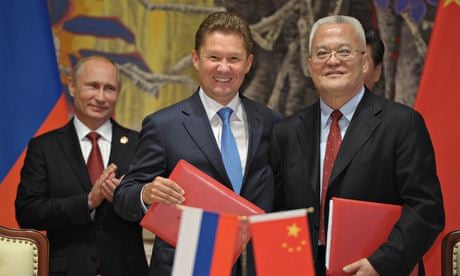

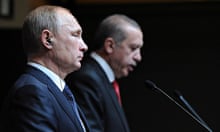
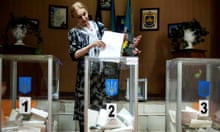

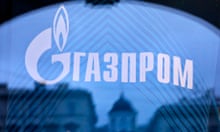
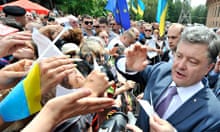


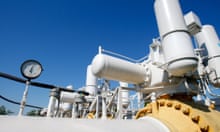

Comments (…)
Sign in or create your Guardian account to join the discussion